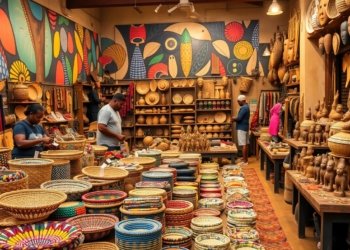Did you know six of the world’s fastest-growing economies are in Africa? The continent is rapidly transforming, offering unmatched opportunities for investors and entrepreneurs. With a young, tech-savvy population and rising consumer spending, it’s no surprise global brands like Heineken and Coca-Cola are thriving here.
Africa’s GDP growth outpaces global averages, projected at 5.7% in 2024. Mobile payments dominate, accounting for 80% of global transactions. This tech-driven landscape creates unique advantages for agile businesses.
The African Continental Free Trade Area (AfCFTA) could boost trade by 52%, opening doors for cross-border expansion. With consumer spending set to hit $1 trillion by 2025, now is the time to explore this dynamic market.
Key Takeaways
- Africa hosts six of the world’s fastest-growing economies.
- GDP growth exceeds global averages at 5.4% (2023).
- Mobile payments lead globally with 80% transaction share.
- Consumer spending will reach $1 trillion by 2025.
- AfCFTA could increase intra-African trade by 52%.
Why Africa Is the Future of Global Business
With returns outperforming BRIC nations, African markets are drawing smart capital. Companies here see average ROIs of 65-70%, compared to 50% in BRICS. This potential isn’t just about numbers—it’s about untapped demand and agility.

Economic Growth Outpacing the World
Africa’s GDP growth consistently beats global averages. By 2025, sub-Saharan economies will expand by 4%, fueled by trade and digital transformation. Nigeria and Angola lead in oil, while Rwanda and Botswana rank above China for ease of doing business.
A Young, Dynamic Population Driving Demand
70% of sub-Saharan Africa is under 30. By 2040, the continent’s workforce will surpass China’s, adding 1.1B professionals. This youth bulge fuels demand for fintech, appliances, and cars—sectors projected to grow by $400B.
Consumer Markets Poised for Explosive Expansion
130M households will have discretionary income by 2025. Urban Africans spend 45% of budgets on groceries, signaling ripe opportunities for retail and banking. Ethiopia and Kenya’s renewable energy push shows infrastructure potential too.
Key Sectors Shaping Africa’s Business Landscape
From mobile banking to renewable energy, key industries are reshaping growth. The Fast-Moving Consumer Goods (FMCG) sector alone will capture $185 billion by 2025. Urbanization and a young population fuel demand for groceries, tech, and housing.
Digital banking thrives with 90% mobile penetration. Companies like Kenya’s M-Pesa and Nigeria’s Flutterwave lead the fintech revolution. Their solutions empower millions without traditional bank access.
Agri-tech bridges food security gaps while creating SME opportunities. Solar energy attracts $3 billion+ in investments as companies tackle infrastructure gaps. Construction booms in Lagos and Nairobi signal real estate potential.
Regional tourism grows 12% yearly, driven by intra-continent travel. Sustainability-focused markets, like Morocco’s $9.6 billion transport upgrade, highlight long-term impact. These sectors prove Africa’s dynamism isn’t just promising—it’s profitable.
Challenges and How to Navigate Them
While Africa offers golden opportunities, smart investors know challenges exist too. From infrastructure gaps to shifting policies, understanding these hurdles separates thriving companies from those that struggle.

Turning Obstacles Into Advantages
35 African nations rank above Russia in corruption indices. Yet, brands like Coca-Cola thrive by adapting. Their micro-distribution centers bypass poor roads, showing hyper-local strategies work.
Elections in 18 countries this year bring short-term risks. However, the security sector grows 15% yearly as companies address uncertainties. Partnering with AfCFTA networks also mitigates trade barriers.
Lagos loses $1.6B yearly to traffic jams. Mobile-first solutions like M-Pesa prove tech can overcome physical gaps. For the informal sector (90% of jobs), digital tools boost productivity.
The digital divide remains—only 39% of employers expect AI’s impact. But with 60% of global firms prepping for automation by 2030, Africa’s agility could turn this into an advantage.
Conclusion: Seizing Africa’s Opportunities Now
Africa’s moment is now—early movers like MTN and Unilever already see 65-70% returns. The continent offers unmatched opportunity, with diaspora investments in real estate growing 22% yearly.
Adapt to “Africa speed” by decentralizing decisions. Target cities like Kumasi and Kisumu for untapped growth. Sustainability drives investment, with carbon-neutral projects attracting EU partnerships.
As Stéphane Paquier notes, “The low-hanging fruit here are watermelons.” For investors, the time to act is today—before the impact becomes everyone else’s gain.
FAQ
Why is Africa considered a hotspot for global growth?
Africa’s economies are expanding faster than many global markets, fueled by a young workforce, rising consumer spending, and increasing foreign investment.
Which industries offer the most potential in Africa?
Key sectors include fintech, agriculture, renewable energy, and manufacturing, driven by innovation and untapped consumer demand.
What challenges do investors face in African markets?
Political instability, corruption, and infrastructure gaps exist, but strategic partnerships and local expertise help mitigate these risks.
How does Africa’s population influence business opportunities?
With over 1.4 billion people—60% under 25—Africa offers a vast, tech-savvy consumer base eager for new products and services.
Is South Africa the only viable market for businesses?
No. While South Africa is a major hub, countries like Nigeria, Kenya, and Egypt also provide thriving markets with unique advantages.
What role does trade play in Africa’s economic expansion?
The African Continental Free Trade Area (AfCFTA) boosts cross-border commerce, creating a .4 trillion market with streamlined regulations.






